Raf Reza is a Toronto-based DJ, producer and 1/2 of the Orphic Apparition record label. Raf has touched many corners of Toronto’s music community over the last 8 years. Between the time curating the bins at June Records and now programming nights at Toronto sound-bar, The Little Jerry, he's kept his ears tuned to music coming from both the local and international community.
His DJ sets are genre-fluid in nature where tracks flow over and under each other through a variety of tempos and sonic palettes. A handful of releases under Raf Reza and various aliases give nods to a healthy musical diet. He's taken himself through several venues beyond North America and was also a participant in the 2019 Red Bull Bass Camp in Calgary. Raf’s acute sensibility and boundless reach will continue to morph the musical boundaries within dance-floors.
From the start: You mentioned you’re from Scarborough.
That’s where I lived when we moved to Canada. I was born in Tokyo. My mom worked there since the 90s, and my dad since the 80s. My family is originally from Bangladesh. I learned English in Tokyo at a Catholic school run by the Brits and American military ex-pats. My parents didn’t work for the military, but it’s one of the few places you could go to get a decent English education. I did a year of Japanese immersion, but it wasn’t really for me. I lived there until I was nine then I moved here to Toronto in 2001. Up until I was 16 or so, we’d spend two months in London because that’s where my extended family was living on my mom’s side, and in the northern part of the UK that’s where my dad’s family lived. So for about two months every year we’d be cutting about, having a good time.
So, you’re a certified globe-trotter!
Ya, not by choice, but it’s been a big part of my life. I’ve had to make friends very quickly, and I realized growing up that I’ve been put into lots of situations, so it’s made me very adaptable.
Do you think that contributed to your awareness and curiosity of music?
I think so. There’s definitely a few factors. For example, my mom, she’s classically trained in the traditional Indian style of music which encompasses all of South Asia, and my aunt was also a recording artist back in Bangladesh. My dad was super into boogie and disco, nothing super deep, but like Zapp and Roger, that kind of 80s funk stuff. He spent a lot of time in Germany too, so things like Moroder were contemporary in his youth. But the biggest impact was my family in England; my cousin and auntie and uncle on my mother’s side. They were very much into the tunes.
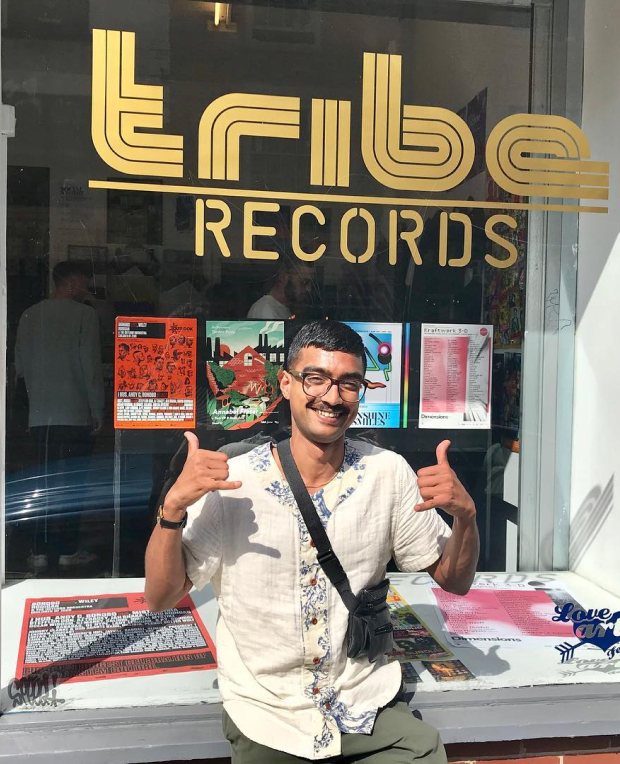
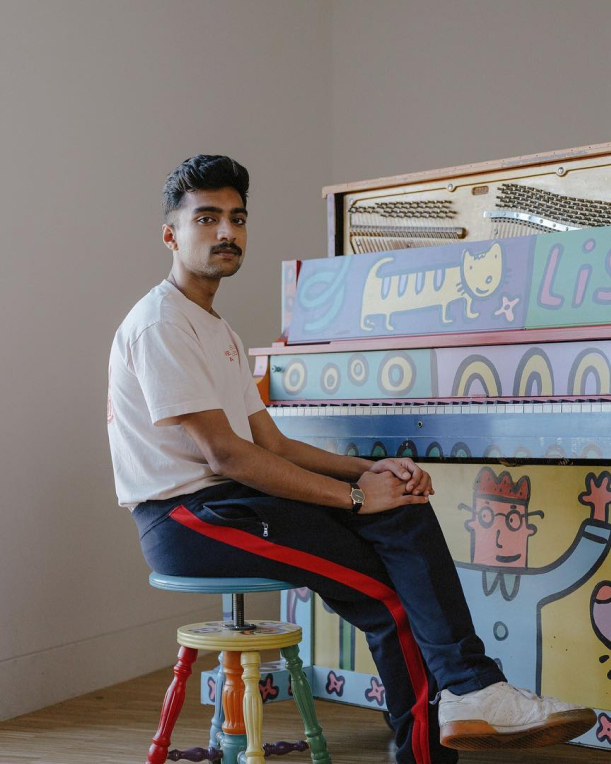
Did you have big parties?
Ya, definitely. The CD player was just fully kicking all day long at my nan’s house. A lot of those mix CDs like Ministry of Sound. We had every volume. They were super influential and gave me a really broad range of stuff. Of course, in England they have loads of music channels on TV playing tunes and videos, so it was a very good way to dive into whatever I was into. I also think the Japanese culture of Otaku and obsessive fanaticism had an impact on me as well. I used to collect cards as well when I was a kid, Gundam and things. Anime too had really cool soundtracks, so I gravitated towards weird and wacky sounds. It didn’t really matter the style.
Did your parents support your musical ambitions, or did you have any musical ambitions at a young age?
My parents put me in all kinds of different music classes, like playing piano and tabla drums, but when I started pursuing music as something I just wanted to do, they weren’t very supportive. Which is kind of common with South Asian immigrant families. They might have wanted me to pursue bigger money making schemes. However, my family in the UK have been extremely supportive. Whenever I go on the road, I stay with them, which gives me a great opportunity to see my family, and it means I have a homebase I fly into and out of. I’m very thankful they’ve stepped up a bit.
Is DJing your full-time job?
It’s not. I feel like I’m somebody who likes working on a multitude of things that are part of a bigger picture. Before I started working at The Little Jerry pre-pandemic, I was working at a record shop which is no longer around called June Records. I was responsible for ordering from international distributors for more niche stuff in the world of dance music, but also adjacent stuff like weirdo experimental music. We all kind of played our part in curating the bins. I was really young when I started doing that, like 22. For me, it was a super exciting opportunity to make lots of connections with different people in other cities, and cultivate a scene here in Toronto for people who were into that sort of thing. A lot of the distributors I was working with had never done business with shops in Toronto. It was super cool to go through three or four hundred records a week and select the most diverse set of everything I could possibly order. This went hand-in-hand with the DJing because I was just buying everything!
[Laughs]
My home bin just kept growing and growing. It was stuff that I had ordered, but also stuff that no-one wanted to spend $44.95 on for an import record, so I guess I have to buy it then! I would say after DJing and producing, and being involved in the community aspect of things, like putting on nights with friends, I eventually ended up at The Jerry doing a few nights a week and also doing the listings for the music and booking people. I like having that multi-level of operating with a larger framework. It gives me perspective from all sides of things. I don’t really see myself as somebody going for it with just DJing. I like having a variety of different experiences and skill sets, trying to build a more non-tangible experience. I think it’s good to just put yourself in different situations. There are some people that are destined to become an expert in a certain thing, but I’m more comfortable in the realm of generalization and seeing how things interact with each other.
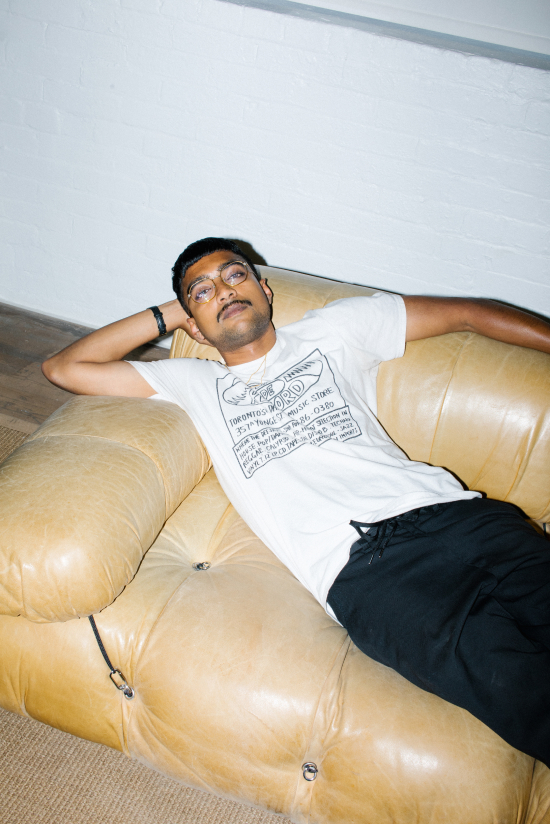
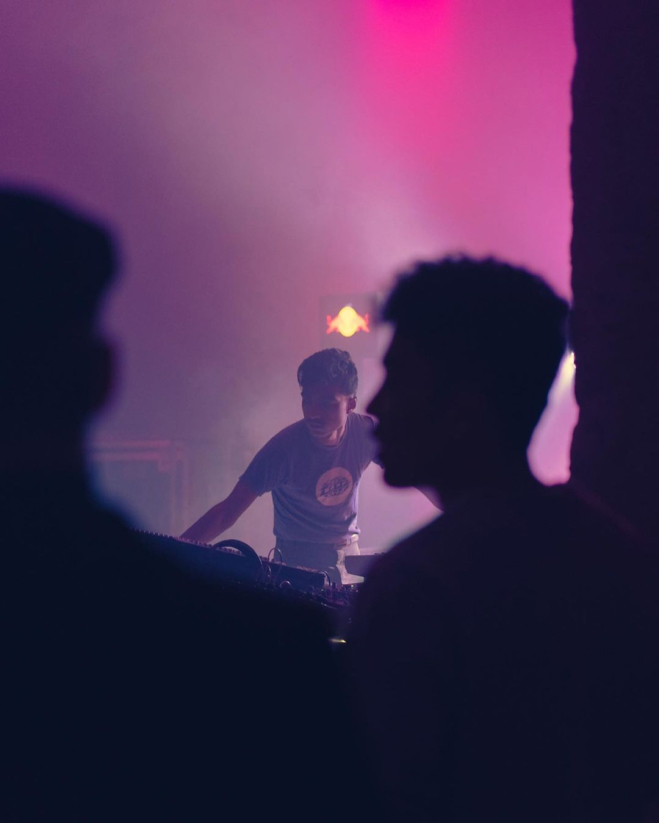
Do you put on parties and events outside of The Little Jerry?
Ya, whenever I’m able to. I’d say once every two months I organize something a little bigger in a DIY space. We just did a party with Turtle Bugg from Detroit where we brought our own sound and set up some lighting rigs. But, I space it out, so I can give it the time it needs. I don’t really try to DJ too much in Toronto. I used to be a circuit DJ for a while, but I just found it a bit exhausting. Toronto is quite small, so if you’re DJing all the time it’s hard to give people the idea of something to look forward to. Even if I’m doing something different every time, there’s only so many people that are going to come out. Though those years of circuit DJing for many years gave me the confidence to take more risks when I’m playing, it was very hard to do. Last weekend I did a three-fer for the first time in years, and holy shit it kicked the shit out of me! It was hard.
It’s like a marathon.
My stamina definitely took a beating over the pandemic! It was still a lot of fun, and I don’t regret it one bit. It’s just, holy hell, I was a little winded by the last day.
I just listened to your Work Redux mix again before our call, and every song feels to me like a hit from a scene or era that has disappeared or been forgotten. Is that your style, or did you just select the catchiest and most melodic songs in your collection?
My approach for the mix was to play some stuff that would be nice to listen to in a living room situation. If I remember correctly, it was a Tuesday, so I probably had just worked a four-day closer and I just really wanted to chill out. A lot of the songs I played had a plushy, airy quality, and sparseness. I like space in music, which for me is like the dubbing of stuff.
What do you mean by ‘dubbing’?
Kind of the dub reggae approach to music. Lots of space. Deconstructing the individual elements and putting it back together, but not necessarily as a song structure, so it’s not so much reggae anymore but just space and cavernous textures. I don’t like things that are too busy. Even in my life. I like having gaps of time where nothing is scheduled so I can just meander with my thoughts. I’m never in a rush to get anywhere. I hate being rushed, or having a whip cracked on me. It’s just so against my way of being. I just feel like good things happen when you have some space to play in.
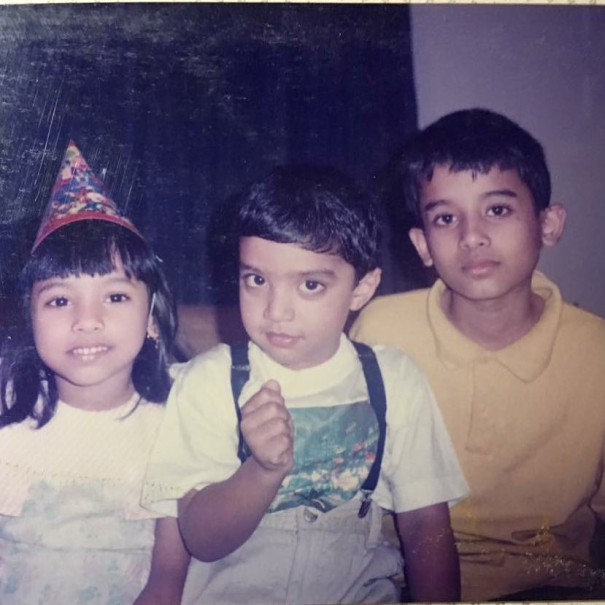
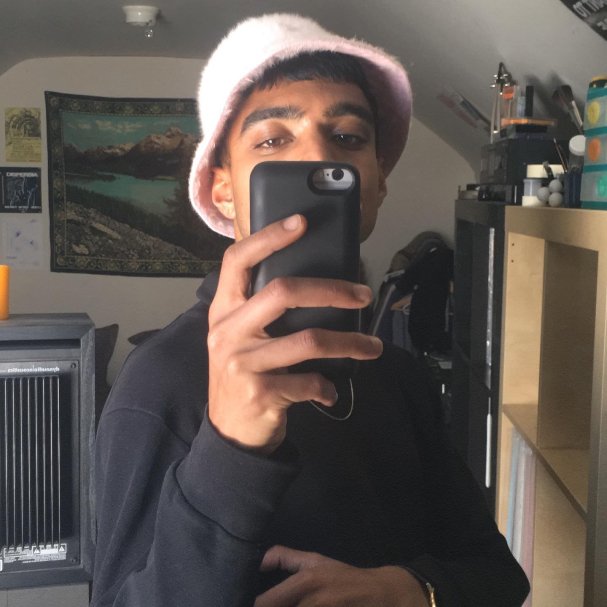
When you’re putting together a mix it sounds like you’re aiming for a feeling.
Definitely. When I made the Work Redux mix it was also around the time I had just moved, so it was like total chaos in my life for a solid six weeks. It made the necessity even more apparent that I need to take a step back and chill out. I really do try and capture where I’m at and my own headspace. I’m very transparent and wear my heart on my sleeve at all times, for better or for worse.
What eras of music do you feel like you’re into right now?
I try to keep a little bit of everything at home. I section my records out by style and country. I never want to have too little or too much of one thing, so I’m always rotating stuff. Right now, in terms of what I’ve been finding in shops, are loads of speed garage, which isn’t exactly a chill out vibe, but it still has some elements of spacious music, especially some of the more Jamaican influenced speedy-g. These are all white labels, made in some basement studio, that have a rawness and earnestness about the sound. Also, lots of atmospheric jungle stuff has been coming around. I always have some idea of what I’m looking for, not necessarily specific, but what kind of mood I’m in, what I have at home, what I’ve been playing recently. Having new worlds that I can dive into at any time is important for me. I’m like a sonic voyeur.
So you go to a lot of shops, is that where most of your musical encounters happen?
I think just given my ADHD tendencies, a place like a shop helps me focus on one thing at a time. I’m always just looking at one record at a time. I pick it up, I hold it in my hand, and it occupies me. Whereas the infinite scroll of the internet can do my head in. That being said, I don’t exclude digital music out of my listening or buying habits, it’s just that in order to tame this beast in my head that tries to get me off track, the physical medium works best. More often than not, if I’m able to obtain a physical record I like a lot, I do that, so that it holds a space in my physical realm. I can see it, I can look at it, I can hold it. I’m interacting with it without being bombarded by other things.
Your body and the music becomes a one-to-one experience.
Exactly. It forces me to tap in and just be there, which is probably why I like record shops so much. It’s also a place where I can chat with people and pick their brain. It makes it a more singular experience where I feel present.
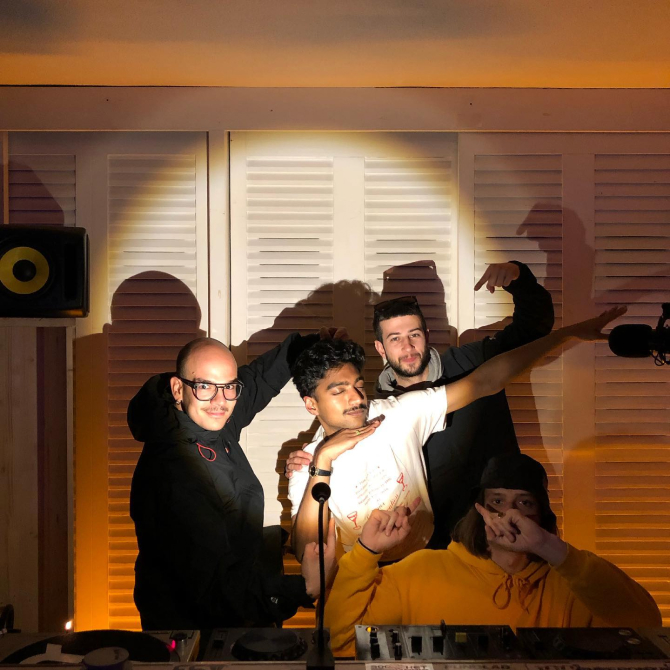
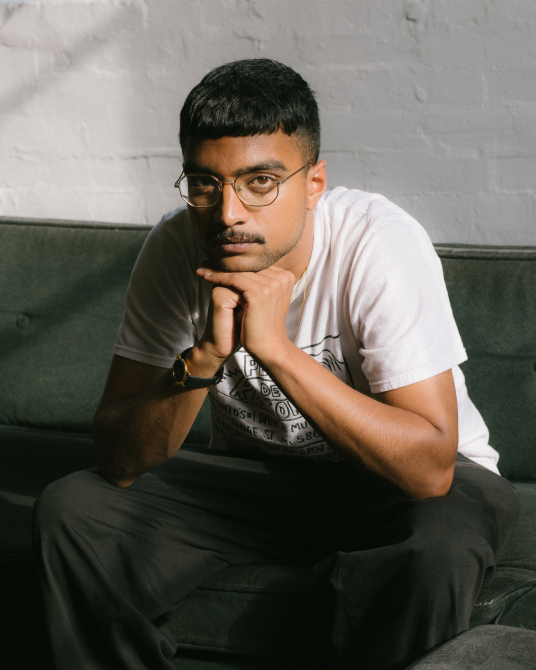
What are some of your favourite spots, without giving away any trade secrets?
I have no trade secrets. There’s no such thing as trade secrets anymore. If people think there are trade secrets they’re full of shit. [Laughs]
[Laughs]
Like I said, I live at Harbord and Spadina so I just go straight down Spadina. I go to Play De Record, Reggae Ryans – which is in Kensington – then I go to Invisible City, then Sonic Boom, and by the time I get to Queen Street there’s Kops Records. So, I’m bound to find something on that trip. It’s my record pilgrimage. I try to do it every couple weeks. I also buy stuff online. Not everything I’m able to find in shops around here, especially stuff that is regional. I was very naive when I worked at June Records. I was like “I work at the best record shop in town,” and I genuinely believed that, however I thought I’d see everything I ever wanted if I waited long enough, but I missed out on a lot of things I could have ordered for a fiver on Discogs. Actually, one of them I played on the mix was one of my biggest doozies. The Swamp Children’s ‘You’ve Got Me Beat’ – really airy, kind of indie rock jazzy joint with a little bit of Brazilian influence. I’ve known of that record for like eight or nine years now. It was one of the first things that hit me in the Factory Records Benelux division which was marketed towards Luxembourg and Belgium and was a bit more experimental than their English UK stuff. That was a five quid record when I discovered it, but I was like “oh ya, I’ll see it sometime,” but I never saw it, and then during the pandemic I paid like eighty bucks to buy it! Now when I want something and I know I don’t have a choice to find it locally, I’ll just hit the send button if I have the cash, so I don’t have to have these regrets.
What was a place where you said to yourself “What is this record doing here?"
There’s so many instances where those things happen. I’ve had some really great moments in Italy. I went to Italy for the first time in 2017, just after my first record came out, and I was really blown away by how much different kinds of stuff was available at record shops. There was this one shop in particular called Metropolis Dischi in Milan that I was going to a lot when I was staying there. There’s just so much stuff that’s there, even Canadian stuff. It’s really cool because I feel most of the shops here have 90% rock records and pop-punk, or that sort of thing. Very rarely will you see other sorts of stuff unless it’s a DJ shop. There just wasn’t so much importing happening here, which is what I think makes record shops interesting. I feel like having a selection of imports from other places is what makes a record shop stand out. Usually when I go to a record shop I’ll flip through their international section first and see what is going on there. It also tells you a story of people’s migration into and out of places. The one thing I like about Toronto in respect to that is the massive Caribbean music that is available here. Reggae, dancehall, soca, you know, calypso, all that sort of thing. It’s just getting harder and harder to find things here, because that’s what all the other DJs want as well. That being said, it’s still around, and there are still great shops in the city and in Scarborough like Henrys Records. I’m always looking for the breadth of stock in a shop, which kind of gives you an insight into what a shop is really about. Are they just here to sell you the Pink Floyd records, and just have a shop for the sake of it, or does it go beyond that to include the cultural makeup of a city?
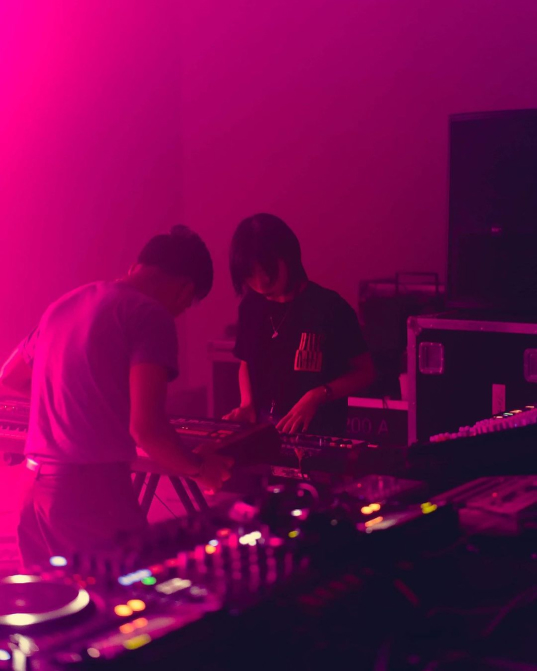
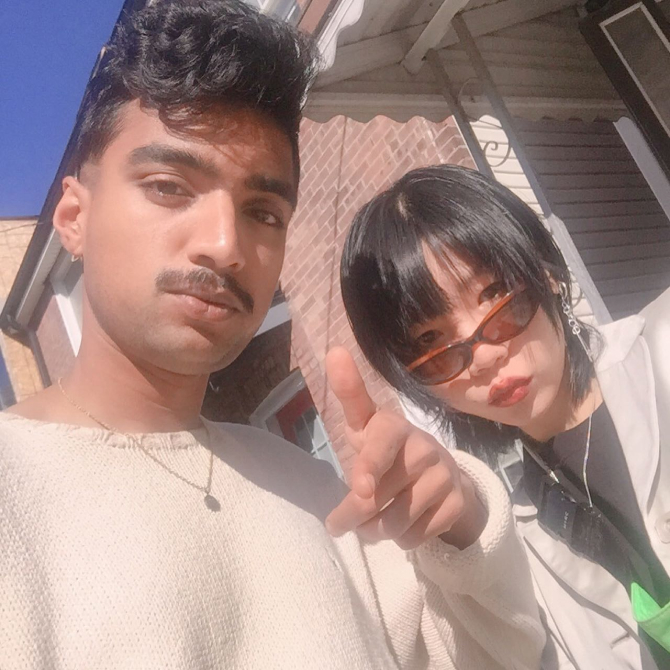
When you first visit a new city, are the record shops the first places you go to see what the city is all about?
Ya, but first you gotta go to the pub and simmer down! Then, yes, the record shops. I try to do a different one everyday, just because time is so limited. I think for me London is the craziest city, because the best of every style of music is in every record shop at all times, and it can be overwhelming and intense, and also makes me think ‘I don’t know shit about shit!’ It’s so humbling. Even after working seven years in a record shop, the more I go out and visit different record shops and discover things, I just realize there is just so much music out there. Everytime I go to a record shop I’m surprised, and that’s what keeps me coming back. Between people sharing things with you or just finding some obscure thing, those are the nuggets that stay with me. The record shops really tell the story about what’s been happening in the city. I actually worked in a record shop in London called Haggle Vinyl. I was 19 or 20. It was run by this old Jewish guy who spent years living in Kibbutz’s after spending a big chunk of time living in an institution with, like, serious mental health situations, then he opened up the shop after being an antique watch dealer that somehow got into records. He’s the most miserable guy you’ll ever meet. He was just on one! Our friendship actually started because he got mad at me. That was the first thing: he scolded me and cussed me out. Then he was like “alright, you know what,” – because they keep all the records catalogued in sleeves in the back of the shop – “I’m too old and my arm hurts, so if you want to buy all these records, you do it yourself and I’ll give you a discount.” And since I was hanging around so much, he started teaching me the cataloguing system, and when he’d go out he’d get me and my friend – who also worked there – to run the shop. He’d leave and put enough money on the counter to buy pasties and a six-pack, and that’s what I did the whole week I was staying there.
It’s like an education.
Ya, and I was being paid for it!
–
Work Redux is a collection of mixes made to be listened to while working. We work closely with local and international DJs to assemble thoughtful music that will carry members throughout their day and introduce them to new sounds. East Room is a shared workspace company providing design-forward office solutions, authentic programming and a diverse community to established companies and enterprising freelancers. We explore art, design, music, and entrepreneurship, visit our news & stories page to read more.